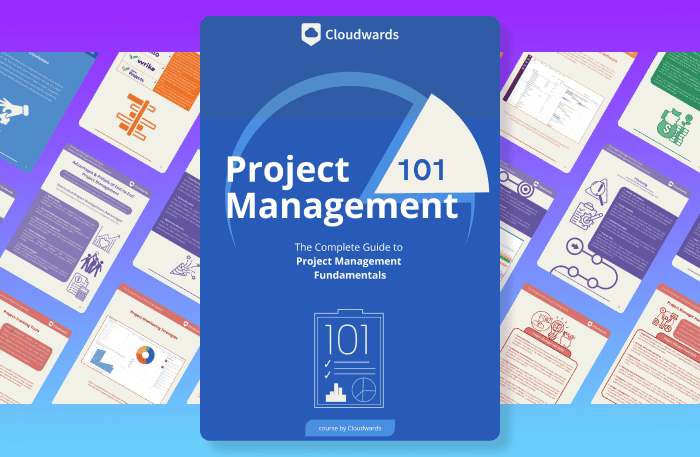The 5 Key Aspects of Project Management: Elements, Components & More in 2025
From project planning to execution, understanding the key aspects of project management can mean the difference between project success and failure. Our in-depth guide covers these elements and provides proven strategies for you to successfully deliver projects.
A project manager wears many hats — from planning and organizing to leading the team and monitoring project progress. To successfully deliver projects that meet stakeholder expectations and achieve project goals, you need to understand the key aspects of project management and utilize the best project management software to streamline workflows.
In this article, we will explore the core concepts of project management that every project manager should know.
Definition: What Is Project Management?
Project management is the process of planning, organizing, managing resources and executing tasks to achieve project objectives. The goal is to ensure timely completion of the project while staying within budget and meeting the requirements. Applying project management practices and some of the best cheap project management software can help accomplish this.
Areas of Project Management Knowledge
Here are the key areas of project management knowledge:
Avoid Costly Project Management Mistakes – Get Free Tips Today!

- Discover 10 fundamentals of project management
- Understand step-by-step plans for PM execution
- Learn tips to avoid 5 common mistakes by beginners
- Defining the project scope
- Developing a project plan
- Scheduling and managing the project timeline
- Executing the project plan
- Determining and mitigating potential risks
- Identifying and engaging project stakeholders
- Implementing and maintaining project quality management
- Budgeting and project cost management
- Acquiring and managing the required resources
- Managing changes to the project scope or resources
The 5 Stages of a Project Life Cycle
The project life cycle, which you can learn about in our end-to-end project management guide, consists of five main stages: initiation, planning, execution, monitoring/control and closure:
- Initiation: Define the project objectives, scope and requirements, and obtain the necessary resources and approvals from key stakeholders. These are usually gathered during stakeholder analysis sessions.
- Planning: Develop a detailed roadmap for how the project will be executed, including creating schedules, budgets and risk mitigation strategies.
- Execution: Carry out project activities, coordinate project teams, manage resources and make adjustments as needed to address any issues and prevent scope creep.
- Monitoring and control: Regularly monitor progress and project performance, identify and resolve problems, and ensure the project stays on track. Check out our monday.com review if you need a comprehensive project management platform for monitoring performance.
- Closure: Conduct a final review, gather lessons learned and formally hand over the final deliverables to the client or stakeholders.

Why Is Effective Project Management Essential to Achieve Successful Project Outcomes?
Effective project management is essential because it provides project teams with a structured approach, sets a clear roadmap for team members to follow, improves communication and aligns everyone on common goals. This leads to better teamwork and fewer misunderstandings, allows for easier progress tracking and helps identify and mitigate risks early on.
What Are the Key Skills of a Project Manager?
The key skills of a project manager include interpersonal skills like communication, problem-solving and organization, as well as hard skills like managing risks and resource allocation. Since project managers play a crucial role in guiding projects to success, they also need technical skills like implementing tools and techniques to manage multiple projects.
Let’s take a look at some of the essential project manager skills in more detail:
- Communication: Effective communication is crucial for project managers to ensure everyone is on the same page. They convey information clearly, actively listen and facilitate discussions within the team.
- Leadership: Project managers should be able to motivate project team members, guide them throughout the project life cycle and make difficult decisions when necessary.
- Problem-solving: When challenges arise, project managers need to think critically, analyze the situation, identify the root cause and come up with practical solutions.
- Risk management: Anticipating and mitigating potential risks is a core responsibility for project managers. They regularly monitor the project and take proactive steps to prevent risks from becoming issues. You can learn more about risks and issues in our risk vs issue guide.
- Change management: Projects often involve changes to timelines, resources or the type of project management frameworks used. A project manager needs change management skills to navigate these changes and keep the team moving forward.
- Proficiency in project management methodologies: Understanding project management methodologies like Waterfall, Critical Path Method and Agile frameworks like Scrum allows leaders to choose the right approach for the project and guide the team accordingly.

The 5 Most Important Aspects of Project Management
Though any aspect of project management is important for achieving successful project outcomes, some are more critical than others. Below, we will explore the five most important aspects in detail, discussing their importance and how they contribute to effective project delivery.
1. Project Scope Management
Project scope management is the first crucial aspect of successful project delivery. This involves identifying the work required to achieve the project’s objective, creating a scope statement and developing a plan and work-breakdown structure (WBS). It’s also important for teams to control the scope throughout the project life cycle.
Effective scope management keeps the project team focused on delivering what was promised and prevents scope creep. Additionally, it ensures that allocated resources are used efficiently and helps maintain project timelines and control costs.
2. Project Planning
The project planning phase involves defining the goals, steps, timelines and milestones needed for successful project implementation. It also involves estimating costs, scheduling tasks, assigning resources and identifying potential risks. A detailed project schedule provides a roadmap for a team to follow so everyone is on the same page and moving in the right direction.
Scope management vs project planning: Scope management defines what needs to be done, whereas project planning outlines how it will be accomplished. They complement one another, with the scope serving as the foundation for the detailed planning process.
3. Project Execution
Project execution is the process of the project team implementing the project plan to produce deliverables. Key activities include assigning tasks, managing budgets and resources, communicating with stakeholders and tracking milestones. The project manager plays a crucial role in overseeing execution, monitoring performance and controlling project quality.
To efficiently execute a project, small teams can use the best project management platforms for small businesses to prioritize tasks and track progress. Additional best practices — such as regular project reporting and implementing change management processes –are essential for complex projects in larger organizations.
4. Risk Management
Risk management is the process of identifying, analyzing and responding to potential risks that may arise during a project. The project manager and team need to proactively identify potential risks, such as budget overruns or technical challenges, and analyze them to determine their likelihood and potential impact.
Based on the risk analysis, the organization can then develop a plan to mitigate or respond to the identified risks. It is also important to continuously monitor and update the risk management plan as the project progresses. Tools like Zoho Projects and ClickUp provide risk registers and risk matrices to help teams manage risks throughout the project life cycle.
5. Stakeholder Management
Stakeholder management involves identifying, analyzing and engaging with the individuals or groups that have an interest in or impact on the project organization. Stakeholders can include customers, investors, employees, suppliers, government agencies and any other relevant parties.
The project manager is responsible for identifying stakeholders and understanding their needs, expectations and potential influence. When done well, stakeholder management can help build trust and support, reduce risks, improve decision-making, gain buy-in and increase project success.

and prioritize risks and assign responsibilities.
Final Thoughts: Project Requirements
Project management requires balancing several key elements. Project scoping and planning lead to the development of a roadmap that outlines goals, timelines and resources. Then, project execution turns the plan into tangible results. Risk management anticipates and addresses potential roadblocks, while stakeholder management keeps everyone informed and aligned.
Project managers need diverse skills. Communication is crucial for providing direction and keeping teams engaged. Problem-solving facilitates planning, issue anticipation and solution creation. Proficiency in project management methodologies and tools equips project managers to lead teams. With these skills, they can navigate complexities and drive projects forward.
For a tool that helps teams identify key elements of a project, check out our Opportunity Canvas guide.
We’d like to hear from you. What aspect of project management do you find most challenging, and why? How have you applied project management principles to your own projects? Are there any additional tips or best practices you recommend for successful project delivery? Share your thoughts in the comments. Thank you for reading!
FAQ: Project Management Skills & Aspects
The key project management aspects include scope management, project planning, project execution and control, project risk management and project stakeholder management.
The three key aspects that merge together in successful project management are scope, time and cost, often known as the project management triangle or triple constraint.
The project scope, schedule and budget are some of the key elements that require a system or process to track and control changes. These elements often shift during a project due to various factors, such as stakeholder requirements, unexpected events and resource constraints.
A time-phased budget — which is a financial planning tool that allocates project costs over specific time periods — can facilitate project cost management. It enables the project manager to effectively monitor and control cash flow, and identify potential budget shortfalls or overruns early on.
Schedules, budgets and project scopes are some elements that require a system or process to track and control changes. These elements can change during a project due to requests from stakeholders, resource constraints or unexpected events.


